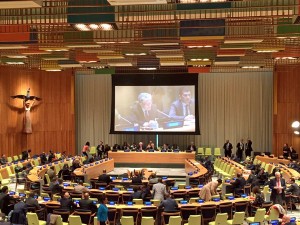Opening remarks by H.E. Mr Mogens Lykketoft, President of the 70th session of the General Assembly at Humanitarian Response in Africa – the Urgency to act
8 April 2016
 Excellencies, distinguished guests, ladies and gentlemen.
Excellencies, distinguished guests, ladies and gentlemen.
You are all very welcome to this informal meeting.
In early March, I travelled to Ethiopia to address the African Union, to participate in a workshop on Peace and Security and to meet with Ethiopian leaders, officials and stakeholders.
While there, I also had the opportunity to visit a Refugee Centre near Addis Ababa and to meet with various UN humanitarian agencies operating on the ground.
What I learned from those meetings prompted me to convene this meeting.
What I learned was not new. In fact, what I heard was very much in line with what I had noticed since the world’s media started to focus on the truly horrific stories emerging from the Syria crisis:
First, I was reminded that the current humanitarian and refugee crisis is truly global in nature.
Yes, the Syria crisis is a major contributor to that crisis but so too is the situation in South Sudan; Yemen, Ukraine; Somalia, Myanmar, the Democratic Republic of Congo, the Central African Republic, Honduras, Haiti and so on.
Yes conflict is creating humanitarian need but so too is climate change, the El Nino effect; political persecution, natural disasters.
Second, I was reminded of the effects of the current gap in humanitarian funding.
It leads to a competition for resources between agencies.
And – as aid flows to those crises that are in the media, public and political spotlight – it leads to a betrayal of the central principle of humanitarianism : that prioritization should be based on humanitarian need alone.
The African continent in particular is suffering because of this.
Of the 60million people displaced worldwide, 17million are in Africa.
Furthermore, 20 million people are food insecure in eastern Africa and 16 million in southern Africa – in part because of the drought resulting from El Nino.
At the same time, however, 76 per cent of refugees in the region were impacted by ration cuts in 2015 and further cuts are planned for 2016.
This situation reminded me of a similar reduction in food rations to Syrian Refugees this time last year, which many believe to have contributed to the surge in numbers crossing to Europe last summer.
Clearly, the overall funding shortfall is having a direct impact on extremely vulnerable populations and it is hurting some crisis and some regions more than others.
It is also contributing to broader instability in those regions and across our world.
While we know that the global economy and individual member states continue to face economic challenges, we also know that the $20billion that the UN says is required for humanitarian response in 2016 is but a fraction – 0.04% – of the global economy (in nominal terms).
Meeting those needs is ultimately a matter of priority, a matter of principle and, I would add, a matter of political leadership.
Of course, meeting today’s humanitarian financing needs is not enough.
What we really need is to reform our overall approach to humanitarian response – take a long term approach both in terms of financing and in terms of building resilience; investing in disaster risk reduction; breaking barriers between the development and humanitarian response so that we move forward with the 2030 Agenda together; and improving the efficiency and effectiveness of our overall response.
This is the task facing the World Humanitarian Summit next month and I hope that today’s meeting can inform deliberations at the Summit and build momentum for real commitments and real reform.
The same is true of the Summit on 19 September on large movements of refugees and migrants. And I am glad to see that Ms Karen Abuzayd, special adviser of the Secretary-General for that Summit, is here with us today.
This afternoon, we have an excellent group of speakers to provide us with the full context of the humanitarian situation in Africa.
And I also hope to hear both from those member states that are contributing humanitarian assistance and those that are dealing with the current crisis and shortfalls head on.
I encourage you all, however, to move beyond a diagnosis of the problem and move towards identifying real and urgent solutions.
Thank you.

